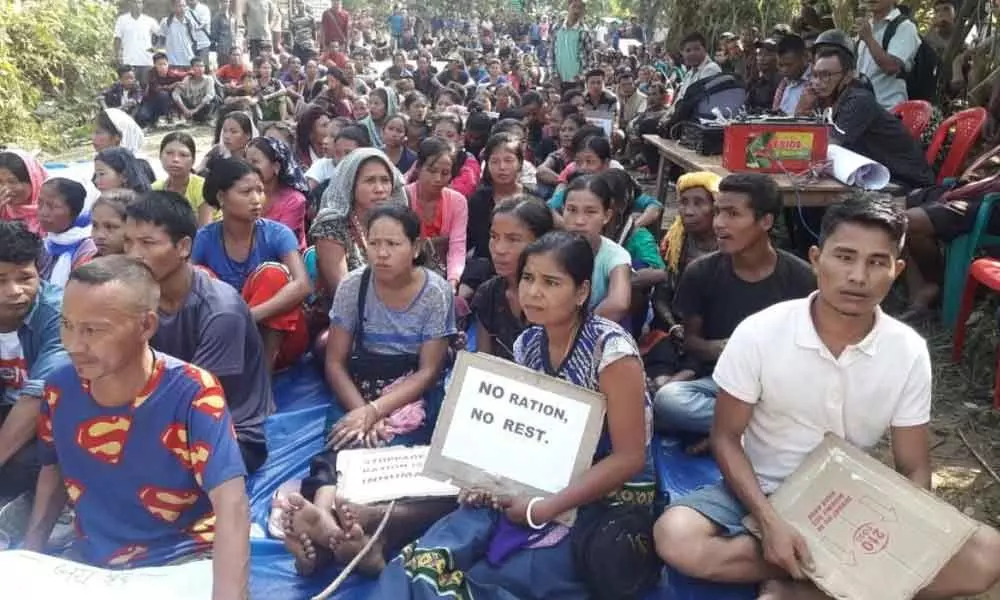Live
- Son-rise: Hemant Soren grows taller as tribal leader, makes father proud
- ISL 2024-25: 10-man NorthEast United FC hold on to take three points vs Punjab FC
- BGT 2024-25: Jaiswal’s application, commitment to form a partnership was so impressive, says Gilchrist
- BGT 2024-25: Personally, I am very happy with my performance, says Harshit Rana
- Pakistan's Lahore remains world's most polluted city despite light drizzle
- Asha Nautiyal retains Kedarnath for BJP, to be back as MLA after 12 years
- India leads world in science, innovation research: Minister
- Flash flood in Indonesia's South Tapanuli claims two lives
- MahaYuti's electoral success testament to leadership of PM Modi, HM Shah: Ajit Pawar
- Unproven remedies: Tata Memorial Hospital slams Sidhu’s viral ‘diet cure’ cancer claim
Just In
Tribal refugees continue road blockade in Tripura


Despite persuasion, tribal refugees sheltered in Tripura for the past more than 22 years after fleeing from neighbouring Mizoram, continued their road blockade of the past three days on Saturday demanding resumption of food and relief supplies.
Despite persuasion, tribal refugees sheltered in Tripura for the past more than 22 years after fleeing from neighbouring Mizoram, continued their road blockade of the past three days on Saturday demanding resumption of food and relief supplies.
Over 35,000 Reang tribal refugees comprising 5,907 families are sheltered in seven relief camps in northern Tripura's two sub-divisions since October 1997 after they fled from their villages in western Mizoram in the wake of communal tension there.
Sub-Divisional Magistrate of Panisagar, Lalnunnemi Darlong and SDM Kanchanpur Abeda Nanda Baidya told IANS over phone on Saturday that food and relief supplies to the refugees were stopped on September 30.
"As per the July 3 (2018) four-partite agreement in New Delhi, the food and relief supplies had been stopped. The refugees are now blockading vital roads since October 31 demanding recommencement of food and relief supplies.
"Under the ninth phase of repatriation, the tribal refugees must return to their villages in Mizoram by November 30, but they are unwilling to go back unless their demands were fulfilled," Baidya said.
According to Darlong and Baidya, in the latest phase of the repatriation process only 670 immigrants have returned to their villages.
The Mizoram Bru Displaced People's Forum (MBDPF), the apex body of the refugees, has also threatened to loot the Kanchanpur government food godowns if the relief supplies are not started immediately.
The MBDPF in separate letters to Prime Minister Narendra Modi, Union Home Minister Amit Shah and North Tripura District Magistrate Raval Hemendra Kumar urged them to resume the relief supplies.
According to an official of the Relief Department, the stalled repatriation of refugees resumed on October 3 with the joint arrangements made by the Tripura and Mizoram governments.
He said, "The repatriation process could not be carried out properly due to protests and obstacles put up by a section of refugees, mostly women."
Subsequently, officials of Tripura and Mizoram led by North Tripura District Magistrate Raval Hemendra Kumar and Lalrozama, Deputy Commissioner of Mamit district, held a meeting with the refugees and adopted a joint resolution.
The resolution said that after the repatriation of the refugees, their security would be ensured and all the schemes of the Central and Mizoram governments would be implemented for the benefit of the Reang tribals, locally called 'Bru'.
The refugees have expressed total dissatisfaction over the ongoing repatriation process. They have demanded an autonomous district council (ADC) for the Reang tribals, re-arrangement of the resettlement areas, liberty to each family to choose their area of resettlement, deployment of Central forces for the protection of the repatriated refugees and cash assistance, the resolution said.
A Home Department official in Aizawl said the Union Home Ministry recently approved Rs 350 crore for the rehabilitation of the Reang tribals, after the completion of the ninth phase of the repatriation process.
The MBDPF in a letter to the Mizoram Home Minister had alleged that the provisions of the four-partite agreement, signed in Delhi on July 3, 2018, had been violated.
The four-partite agreement had finalised a six-point benefit package for each refugee family.
It included Rs 4 lakh financial aid, monthly allowance of Rs 5,000, Rs 1.5 lakh for building a house and free ration for two years.
But the refugees later refused the package, demanding security by Central paramilitary forces and allotment of five hectares of land to each refugee family, besides the formation of an area development council for the Reang tribals, which is a primitive tribe among the tribals.
The refugees hail from three districts in Mizoram -- Mamit, Lunglei and Kolasib -- spanning across nine of the state's 40 Assembly constituencies.

© 2024 Hyderabad Media House Limited/The Hans India. All rights reserved. Powered by hocalwire.com






